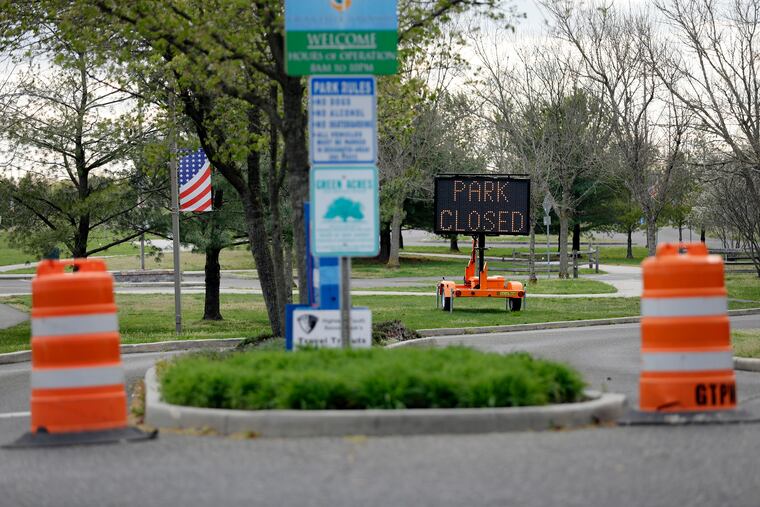‘It’s very important to have hope,’ says Pa. health secretary; New Jersey’s hospital peak could come this weekend
Pennsylvania and New Jersey are both seeing progress as the rate of coronavirus infections slows, but the states are not out of the woods and officials warned residents to continue staying home.

New Jersey’s peak surge in coronavirus hospitalizations could come during the weekend, state officials said, with hospitals projected to see their patient load nearly double from Thursday’s 7,360 to 14,400.
At the same time, said Gov. Phil Murphy, the state is “in the early stage of progress" as the rate of infections slows — as it has in Pennsylvania, where officials urged residents to have hope Thursday but cautioned that the state is not out of the woods.
Social distancing measures are working, said Pennsylvania Health Secretary Rachel Levine, imploring people to continue staying home to slow the spread of infection, underscored by Gov. Tom Wolf’s Thursday order for all Pennsylvania schools to remain closed for the rest of the academic year.
“The curve has changed,” Levine said, but it is “not completely flat.... We need to maintain our vigilance.”
Pennsylvania’s number of cases is no longer doubling every two days but is still increasing, particularly in the Philadelphia region and in northeastern counties. Officials reported Thursday an additional 1,989 cases and 29 deaths from the virus, bringing the death toll to 338. The number of confirmed cases reached 18,228.
» READ MORE: Gov. Tom Wolf orders Pennsylvania schools closed through rest of academic year
In New Jersey, the death toll reached 1,700 on Thursday — more than twice the number of state residents who died in the Sept. 11, 2001, attacks. The state has surpassed 50,000 confirmed cases, with 3,748 new cases reported Thursday.
Murphy also announced an executive order giving residents insurance-payment relief, and said health officials would provide $5 million to localities for contact tracing, long-term-care facility operations, and county testing efforts.
The Philadelphia region and Pennsylvania’s northeastern counties continue to see “widespread community transmission,” state officials said. The state plans to open a field hospital in East Stroudsburg, Monroe County, and a testing site somewhere in the northeastern area, Levine said.
Federal officials reversed a decision to pull funding for coronavirus tests in Montgomery County, Rep. Madeleine Dean (D., Pa.) said. The county’s testing center at Temple University’s Ambler Campus closed Thursday, but the federal government will provide funds to open a larger testing site at Montgomery County Community College in Blue Bell by Wednesday, County Commissioners Chair Val Arkoosh announced.
Philadelphia’s testing site at Citizens Bank Park, also a federally funded facility, closes Friday — but the city can “handle that closure” and will distribute the site’s remaining supplies to some of the other roughly 20 testing sites in the city, said City Health Commissioner Thomas Farley.
Levine said federal resources will be “coming to help” the state’s hospitals, which report they are collectively losing hundreds of millions of dollars a month due to the coronavirus. She did not elaborate on what those resources might entail but said the state will also “be looking” to help.
She also offered a glimpse of life after the lockdown, saying the state is already working on plans for how social distancing measures will be lifted or easing of the restrictions will be tested once it is safe to do so.
“It’s very important to have hope,” she said. “There will be a time when we will be able to start to relax the social distancing … the business closures, and the stay-at-home orders. But it will not be one grand day where we do that.…It’s going to be over time. It’ll have to go in a slow, progressive fashion.”
Philadelphia now has 5,000 confirmed cases of the coronavirus and more than 100 deaths, city health officials said Thursday.
» READ MORE: As the pandemic surges, ‘no one deserves what’s brewing in Kensington.’
“The good news is the growth is slowing,” said Farley, reporting 494 new cases Thursday, “but we absolutely cannot assume that it will continue that way.”
After contradicting federal officials’ statements Wednesday that Philadelphia was becoming a hot spot for the virus — reporting instead that the infection rate was “stabilizing” in the city — Farley said Thursday that the national attention could help residents understand the need to social distance and allow the city to get more resources.
He said federal officials based their concern on the city’s having a higher percentage of positive tests compared with other cities. Farley said he believes that number — 27.8% as of Wednesday — has stabilized along with the daily case numbers.
He was “cautiously optimistic,” but he and Mayor Jim Kenney reminded residents Thursday that Philadelphia has been hit hard by the virus, particularly in African American communities, and said the city hadn’t turned any corners yet.
In Delaware, there was no sign of flattening as the state saw its largest one-day spike, passing 1,000 total cases.
“We’re seeing the surge,” Gov. John Carney said during a news briefing. He said a model from the University of Washington showing that Delaware’s peak had passed was “just not true.”
In Wilmington, Philadelphia, Harrisburg, and Trenton, as in cities across the country, officials reminded residents that the only way to ease the coronavirus’ grip is to stay away from contact with others.
“This is the fight of our lives to protect our families, our friends, our neighbors,” Murphy said. “We need you to stay home, period.”
Staff writers Rob Tornoe and Vinny Vella contributed to this story.